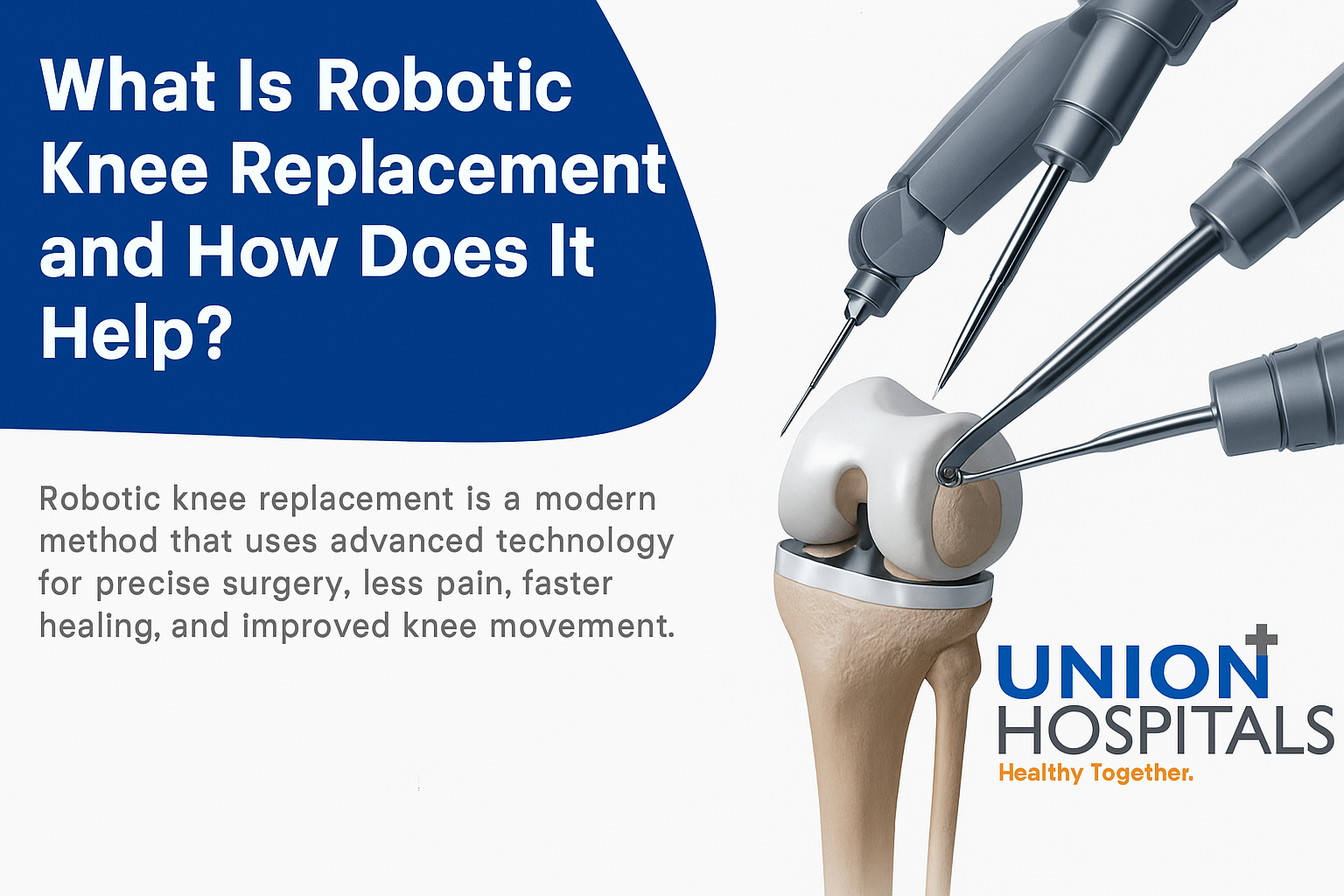
- Health Tips
- November 15, 2025
Understanding Robotic Knee Replacement Surgery
Robotic knee replacement is an advanced and modern method used to treat severe knee pain. In this surgery, doctors use a special robotic system along with a small 3D camera. Only tiny cuts are made, usually around 3 inches, which makes the procedure safer and gentler. The 3D camera shows a very clear picture of the inside of the knee, and the doctor controls the robotic arms to do the surgery with great care.
The robot does not work alone. The doctor handles everything and uses the robot only to improve accuracy. The damaged knee parts are removed and replaced with a new implant that fits perfectly. This reduces pain, lowers the chance of infection, and helps patients recover much faster.
To understand it simply—when you cut wood with a machine, you get a perfect shape. The same idea applies to robotic knee replacement. Because the cuts are exact, the new knee fits better and lasts longer.
Why Robotic Knee Replacement Works Better
Robotic knee replacement works better than traditional surgery because of its high precision. Think of a cookie cutter—every shape comes out exactly the same. In the same way, the robot helps doctors make the perfect cuts so the implant fits smoothly, like a puzzle piece fitting into place.
Just like drawing with a ruler gives you a straight line, robotic assistance helps doctors operate with complete accuracy. Because of this, patients experience:
Less pain
Faster recovery
Better knee movement
Longer-lasting implants
Traditional surgery may not always achieve this level of accuracy, which is why robotic surgery is often preferred.
Why Doctors Recommend Robotic Knee Replacement
Doctors prefer robotic knee replacement because it gives a clear, detailed 3D map of the patient’s knee. This technology helps the doctor plan the entire surgery with great accuracy. The implant is placed exactly where it should be, which means:
Smoother and natural movement
Faster healing
Lesser pain
Long-term relief
Every surgery is customized to match the patient’s unique knee structure. That’s why recovery and results are usually much better.
Who Needs Knee Replacement Surgery
People who face long-term and severe knee problems may require robotic knee replacement. This includes:
Older adults with Osteoarthritis (age-related knee damage)
People with Rheumatoid Arthritis (swollen, painful knees)
Individuals with major knee injuries from accidents or sports
People with knee deformities causing pain, stiffness, or difficulty walking
When knee pain stops you from doing daily activities like walking, climbing stairs, or even standing for long, surgery becomes the best solution.
What Happens If You Delay the Surgery
Delaying robotic knee replacement can cause several problems:
Recovery becomes slower
Pain keeps getting worse
Knee may become more damaged or deformed
Walking and climbing stairs become harder
Surgery may become more complicated
Overall quality of life reduces
Risk of complications increases
Doing the surgery at the right time ensures faster recovery and better long-term results.
Success Rates of Robotic Knee Replacement
Robotic knee replacement has excellent success rates:
In India: 90–95%
Worldwide: 85–90%
This means most patients get strong pain relief, better movement, and long-lasting results after surgery.
When Can You Walk After Surgery?
Most patients can begin walking within 24 hours after robotic knee surgery.
Day 1: Walk with support
After a few days: Walk short distances
After 1–2 weeks: Walk more comfortably
Because the cuts are small and precise, patients usually feel better much sooner.
When Can You Return to Normal Activities?
Recovery depends on:
Your overall health
How well you follow physiotherapy
The knee condition before surgery
If the surgery is done on time, recovery is much quicker. Most patients return to normal activities like walking, climbing stairs, and doing light home activities within 4–6 weeks. Studies show that nearly 90% of patients get back to daily activities comfortably within this time.
Conclusion
Robotic knee replacement is one of the safest and most effective treatments for long-term knee pain. It uses modern technology to help doctors perform the surgery with high accuracy, less pain, and faster recovery. Many patients start walking within a day and return to normal life within a few weeks.
If knee pain is stopping you from enjoying your daily activities, don’t ignore it. Meeting an orthopedic doctor at the right time can protect your knee and improve your quality of life. Robotic knee replacement can help you walk freely, stay active, and live a more comfortable, pain-free life again.

